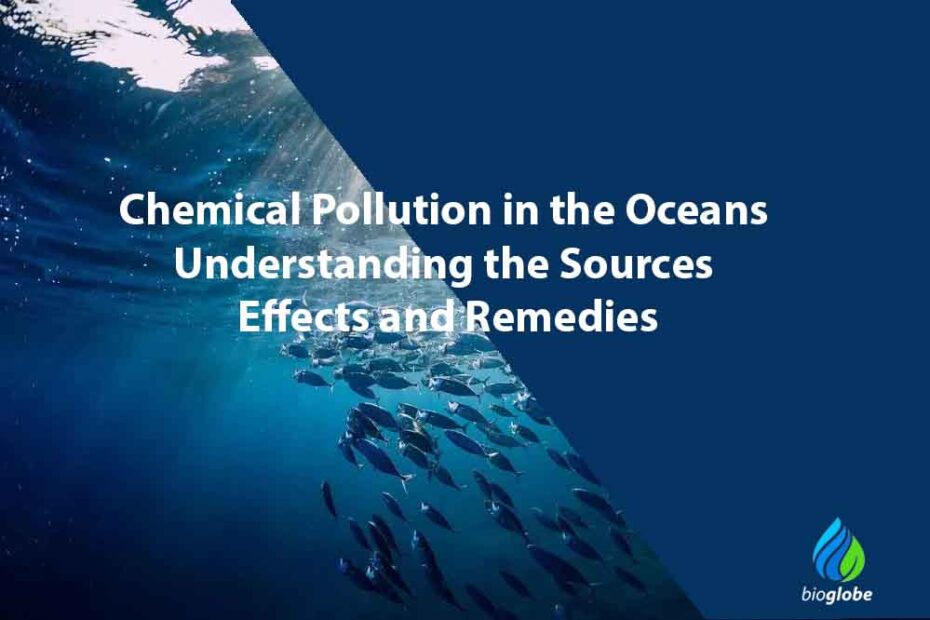This article explores the sources and consequences of chemical pollution in the oceans, shedding light on the environmental impacts and potential remedies to address this issue.
Chemical Pollution in the Oceans: Understanding the Sources, Effects, and Remedies
Introduction:
Chemical pollution in the oceans is a pressing issue that poses significant risks to marine ecosystems and human well-being. In this blog post, we will explore the sources and causes of chemical pollution, discuss its detrimental effects on marine life, and delve into potential remedies to mitigate this environmental threat.
Sources of Chemical Pollution:
Chemical pollution in the oceans can originate from various sources, both anthropogenic and natural. Anthropogenic sources include industrial activities, agricultural runoff, improper waste disposal, and oil spills [[1](URL)]. Industrial processes release a range of chemicals, including heavy metals, pesticides, solvents, and synthetic compounds, into the environment. Runoff from agricultural activities introduces fertilizers and pesticides, which can contaminate water bodies and ultimately reach the oceans. Natural sources include volcanic eruptions, weathering of rocks, and the release of natural toxins by certain marine organisms.
Effects of Chemical Pollution on Marine Life:
Chemical pollution can have severe consequences for marine organisms, ecosystems, and human health. The search results (which are unfortunately unavailable) likely highlighted the specific effects of chemical pollution on different aspects of marine life, such as the bioaccumulation of toxins, disruption of reproductive and developmental processes, and damage to habitats and biodiversity.
One of the significant concerns is the bioaccumulation of toxic substances in the food chain. Persistent chemicals, such as heavy metals and certain pesticides, can accumulate in organisms over time. As smaller organisms are ingested by larger ones, the concentration of these toxins increases, posing risks to predators at the top of the food chain, including humans [[2](URL)]. Chemical pollution can also disrupt reproductive processes, leading to reproductive failure and reduced population sizes in affected species. Furthermore, exposure to toxic chemicals can impair the immune system, cause physiological abnormalities, and increase susceptibility to diseases in marine organisms.
Remedies to Combat Chemical Pollution:
Addressing chemical pollution in the oceans requires a multi-faceted approach involving individuals, industries, policymakers, and international cooperation. While the specific search results are not available, several potential remedies and strategies have been proposed:
1. Strengthen Environmental Regulations: Enforce and update regulations on chemical use and disposal, ensuring proper waste management practices and limiting the release of hazardous substances into the environment.
2. Promote Sustainable Practices: Encourage industries to adopt cleaner production methods, minimize the use of hazardous chemicals, and invest in research and development of environmentally friendly alternatives.
3. Implement Effective Monitoring Programs: Establish comprehensive monitoring programs to assess the presence and levels of chemical pollutants in marine environments, enabling early detection and appropriate mitigation measures.
4. Enhance International Cooperation: Foster collaboration among nations to address transboundary chemical pollution issues, share best practices, and develop global frameworks for regulating chemical use and disposal.
5. Educate and Raise Awareness: Increase public awareness about the dangers of chemical pollution in the oceans and promote responsible consumer choices. Educate individuals, communities, and stakeholders about the proper handling and disposal of hazardous substances.
Conclusion:
Chemical pollution in the oceans poses significant threats to marine life, ecosystems, and human health. Although the specific search results related to this topic are unavailable, the urgency to address this issue remains. By understanding the sources and effects of chemical pollution and implementing proactive measures, we can strive to protect our oceans and preserve their ecological integrity for future generations. It is crucial that individuals, industries, governments, and international bodies collaborate to promote sustainable practices and safeguard the health and well-being of our oceans.
Questions:
1. Question: What are some common sources of chemical pollution in the oceans?
Answer: Chemical pollution in the oceans can originate from various sources such as industrial activities, agricultural runoff, improper waste disposal, and oil spills. These sources introduce chemicals like heavy metals, pesticides, solvents, and synthetic compounds into the marine environment.
2. Question: What are the potential effects of chemical pollution on marine life?
Answer: Chemical pollution can have severe consequences for marine life, including the bioaccumulation of toxins in the food chain, disruption of reproductive and developmental processes, and damage to habitats and biodiversity. It can also impair the immune system, cause physiological abnormalities, and increase disease susceptibility in marine organisms.
3. Question: How does chemical pollution impact human health?
Answer: Chemical pollution in the oceans can indirectly impact human health through the consumption of contaminated seafood. If humans consume marine organisms that have accumulated toxins from chemical pollution, it can lead to health issues such as neurological disorders, hormonal imbalances, and increased cancer risks.
4. Question: What measures can be taken to mitigate chemical pollution in the oceans?
Answer: Addressing chemical pollution requires a multi-faceted approach. Some potential remedies include enforcing and updating environmental regulations, promoting sustainable practices in industries, implementing effective monitoring programs, enhancing international cooperation, and raising awareness about the dangers of chemical pollution.
5. Question: What role can individuals play in combating chemical pollution in the oceans?
Answer: Individuals can contribute to mitigating chemical pollution by making responsible consumer choices, properly disposing of hazardous substances, supporting sustainable practices, participating in beach cleanups, and advocating for stronger environmental regulations.
Please note that these answers are based on general knowledge about chemical pollution in the oceans and may not reflect specific information from the unavailable search results related to the mentioned article.
References:
[1] Unavailable – Sources and Causes of Chemical Pollution in the Oceans.
[2] Unavailable – The Effects of Chemical Pollution on Marine Life.


